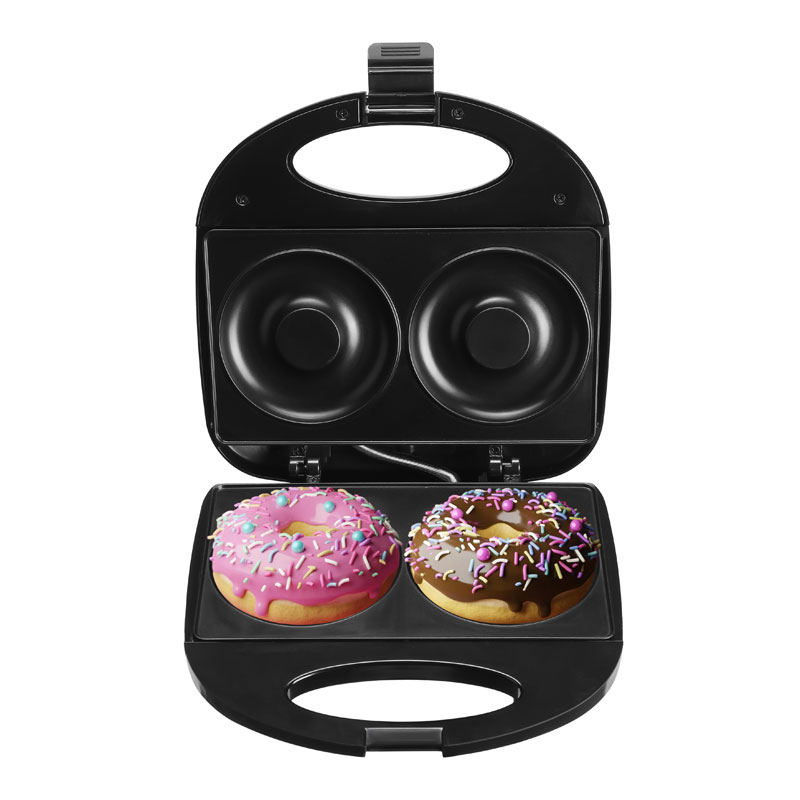Why do donuts made by home donut makers collapse?
2025-07-17
The collapse of donuts made by home donut maker may be caused by the following reasons:
1. Batter recipe problem
The batter is too thin or too thick: If the consistency of the batter is not appropriate, the batter cannot support the structure of the donut and may collapse during heating. Too thick batter may expand unevenly, resulting in golden appearance but incomplete expansion inside, and eventually collapse.
Too much sugar: Too much sugar may cause the surface of the donut to form a crust quickly, while the internal structure is not fully expanded, and eventually collapse.
2. Insufficient fermentation
The fermentation time is too short: If the dough is not fully fermented and there are not enough bubbles, the volume of the donut will not increase, and it is easy to collapse during baking. Donuts need enough time and appropriate temperature to ferment. Usually during the fermentation process, the dough will expand to twice its original size.
Inappropriate fermentation temperature: If the fermentation temperature is too low, the activity of the yeast will be affected, resulting in insufficient fermentation, which will affect the expansion and taste of the donut.
3. Temperature problem of donut machine
Temperature is too low: If the home donut maker is not fully preheated or heated unevenly, the batter will not reach enough temperature to expand in a short time, and it will collapse easily. Make sure that the machine is fully preheated and maintains a stable temperature before using the donut machine.
Uneven heating: The heating plate of some donut machines may have uneven temperature, causing some parts of the donuts to mature prematurely while other parts are still not fully cooked, which may cause collapse.
4. Over- or under-mixing of dough
Over-mixing: Over-mixing the dough will destroy the bubbles in the dough, causing the donuts to be unable to remain stable when expanding, and then collapse.
Under-mixing: If the dough is not mixed evenly, the yeast cannot be fully distributed, resulting in insufficient fermentation in some places, forming an uneven structure, which leads to collapse.
5. Over-baking or insufficient heat
Over-baking: If the donuts are baked for too long, the crust will be too dry, and the inside may not be fully cooked, resulting in a crust on the surface of the donuts, and the internal structure cannot support it, and eventually collapse.
Insufficient heat: If the donuts are not fully baked and the interior is not fully formed, the donuts are prone to collapse after cooling.
6. Effects of sugar or other ingredients
Too much sugar or fat: Too much sugar or fat may affect the expansion and structural stability of the donuts. Too much sugar and fat may cause the donut skin to form faster, resulting in insufficient expansion inside and collapse.
Improvement methods:
Adjust the batter formula: Make sure the ratio of liquid to dry materials is appropriate, and the consistency of the batter should be appropriate, not too thin or too thick.
Full fermentation: Make sure the dough is fully fermented, the temperature and time during fermentation should be appropriate, and the dough volume should be expanded to more than 2 times.
Preheat the donut machine: Make sure the donut machine is fully preheated before use, so that the batter can expand quickly and avoid collapse.
Avoid over-mixing: Be gentle when mixing the dough to avoid destroying the bubbles.
Control baking time and temperature: According to the instructions of the home donut maker, adjust the appropriate time and temperature to ensure that the donuts can fully expand and the crust is not dry.
Through these methods, you can reduce the collapse of the donuts and make more perfect donuts!






